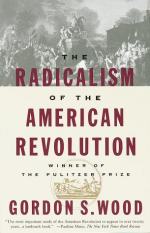|
This section contains 1,596 words (approx. 4 pages at 400 words per page) |

|
Part 3, Chapter 14 Summary and Analysis
In the 18th century, democracy is a technical term for government by the people, but this is impossible in a large community. Americans search for ways to overcome the problem. Mob actions during the imperial crisis are not symptoms of democracy, but proof society is organized paternalistically. The Stamp Act spawns the first nonreligious public pressure groups, and in the 1770s, artisans put up slates of candidates and win elections on the grounds the gentry cannot adequately represent their interests. Other groups, occupational, religious and ethnic, follow suit, beginning the march towards modern American politics: Consciously oriented towards pluralism, ethnicity and interest groups. "Actual representation" goes back to the beginnings of American history and proves a powerful idea as people increasingly mistrust one another. As early as the 1760s, self-interest is becoming the principle of all human actions, and...
(read more from the Part 3, Chapter 14 Summary)
|
This section contains 1,596 words (approx. 4 pages at 400 words per page) |

|




